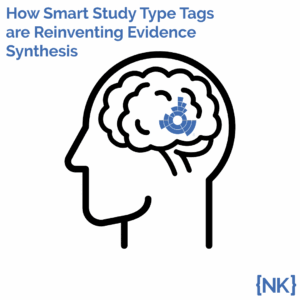
How Smart Study Type Tags Are Reinventing Evidence Synthesis
One of the features of Core Smart Tags is Smart Study Type – this refers to our AI system that automatically categorises the study type

We are thrilled to announce that Nested Knowledge has been awarded a Phase I SBIR grant from the National Library of Medicine (NLM) at the National Institutes of Health (NIH). This grant provides $304,971 in total funding towards building automated quantitative extraction from text and tables in medical literature.
With this grant, the NIH is recognizing the need for more efficient and effective SLRs, essential for regulatory, reimbursement, and clinical decision-making. Today, traditional SLRs are time-consuming and costly, with reviews taking an average of 18 months and $141,000 to complete, often performed manually in Excel. This creates a gap, leaving many critical topics in fast-moving fields without up-to-date reviews. Our work at Nested Knowledge aims to bridge this gap by developing tools that streamline and accelerate SLRs, enhancing the evidence base available for clinical and regulatory decisions.
Features we build as part of our work on this grant will be positioned within our current offering, and will further our mission to revolutionize Systematic Literature Reviews (SLRs) through innovative workflow and automation software that transforms the evidence synthesis process. Our platform already integrates AI for the automation and augmentation of searching, screening, and extraction of abstract and full-text data. Now, supported by this grant, we will further expand these automation capabilities with features designed to extract quantitative data from tables in clinical studies—a traditionally manual process that remains a key bottleneck. By automating this step, we can significantly enhance the speed and efficiency of evidence synthesis, enabling continuous updates and more comprehensive reviews.
We are excited to embark on this project, which will not only expand our capabilities but also empower researchers to execute on increasingly complex study designs with greater speed. This tool will integrate seamlessly into our existing platform, providing an end-to-end AI-assisted SLR workflow with the added benefit of human oversight.
Thank you to the NIH for supporting this endeavor and to our community for your ongoing commitment to advancing healthcare research. Stay tuned as we continue to make progress on this exciting journey toward transforming clinical data synthesis with the power of AI.
Read more about the award.
Yep, you read that right. We started making software for conducting systematic reviews because we like doing systematic reviews. And we bet you do too.
If you do, check out this featured post and come back often! We post all the time about best practices, new software features, and upcoming collaborations (that you can join!).
Better yet, subscribe to our blog, and get each new post straight to your inbox.

One of the features of Core Smart Tags is Smart Study Type – this refers to our AI system that automatically categorises the study type